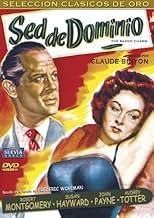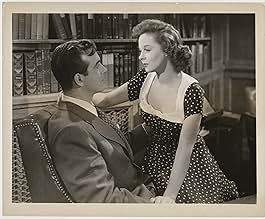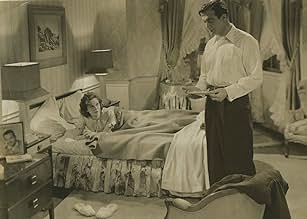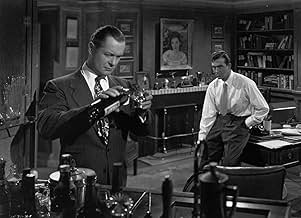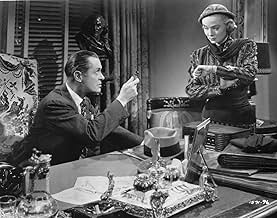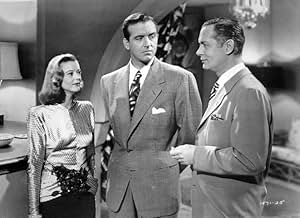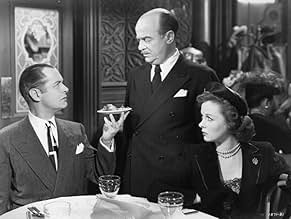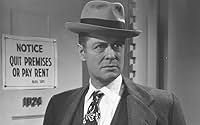Añade un argumento en tu idiomaIn order to get his way, New York producer Matt Saxon manipulates and controls everyone around him but his latest protégé, novelist Eric Busch, finally stands-up to him.In order to get his way, New York producer Matt Saxon manipulates and controls everyone around him but his latest protégé, novelist Eric Busch, finally stands-up to him.In order to get his way, New York producer Matt Saxon manipulates and controls everyone around him but his latest protégé, novelist Eric Busch, finally stands-up to him.
- Dirección
- Guión
- Reparto principal
- Premios
- 2 premios en total
- Hermy
- (as Henry Morgan)
- Guest at Mexican Inn
- (sin acreditar)
- Mrs. Noble
- (sin acreditar)
- Peter Stanhope
- (sin acreditar)
- Mrs. Maddox
- (sin acreditar)
- Cyril Leatham
- (sin acreditar)
- Buxom Nurse
- (sin acreditar)
- Bus Boy
- (sin acreditar)
- Ingenue
- (sin acreditar)
- Restaurant Patron
- (sin acreditar)
Reseñas destacadas
The other lead actors are cast unconventionally. Payne handles a realistic dramatic part very capably and believably. Hayward is very surprisingly convincing as a gentle, soft spoken wife -- showing only briefly, when appropriate, a bit of her usual strong, firey, agressive screen presence. Totter gives a fairly capable performance, though she seems miscast; her sometimes strange facial expressions and mannered body language better suited a character more edgy and dark than the one she's playing here.
I wonder how this cast ended up in this Universal International film. Payne, Hayward, Harry Morgan were all Fox contractees. Totter an MGM player. (Montgomery was freelancing by this time, and made several films released through Universal.)
Anyone who knew anything about the theater knew that Montgomery was basing his character on Broadway producer Jed Harris. Harris was a theatrical genius with an ego the size of South America and the antics you see here are mild compared to the real deal. Harris was used also by John Barrymore in 20th Century and Warren William in Varsity Show as a model. But in those he was eccentric, here he's a first class heel who thinks he's the center of the world.
Based on his reputations novelist John Payne seeks out Montgomery to produce his play. But Montgomery has to have his own imprint on the work and he weaves Payne into his web. It breaks up Payne's marriage with Susan Hayward in the process. Of course not helping is the clumsy pass Montgomery makes at Hayward.
Best in the film and possibly a career role for her his nightclub singer Audrey Totter who is Montgomery's main squeeze. She's loyal to a fault until Montgomery does deliberate dirt in fact goes out of his way to do it to her. Montgomery is married to Heather Angel, but they have an arrangement that also doesn't end well.
The real Jed Harris probably could have sued. But I suspect he rather enjoyed his reputation as a heel and enjoyed The Saxon Charm just as you will.
It was different from the other two films, for it does not deal with criminals or an underside of life that most of us avoid. Instead, THE SAXON CHARM dealt with the legitimate theater. Montgomery's Matt Saxon was a successful Broadway producer who did not stop at anything to get his way. As such, he represented many Broadway performers or writers or choreographers worst nightmares, for Broadway was full of people like Saxon. Years later David Merrick would have such a reputation - brilliant producer/absolute rat. In 1946/47 the person most people would have thought of was Jed Harris. Jed Harris should not be confused with George M. Cohan's partner Sam Harris (a nicer man from most accounts - portrayed by Richard Whorf in YANKEE DOODLE DANDY). Jed Harris was a first rate heel. If you read Katherine Hepburn's memoirs ME:STORIES OF MY LIFE, Harris was the producer of her famous Broadway flop THE LAKE. Today it is recalled because it is used by Hepburn in the movie STAGEDOOR, where we hear it's dialog, beginning with "The kallallillies are in bloom again..." In 1936 it was not a laughing matter to Hepburn, who found that Harris had botched the production out of malice towards her. She had to pay him a huge sum of money to get out of her contract on the play when he took it on the road. Harris also made an enemy of Laurence Olivier, whom got his revenge in a neat way. When making up his features for RICHARD III, Olivier made his evil king look like an exaggerated Jed Harris (and most of Broadway approved).
Matt Saxon is similarly selfish, ready to turn on everyone and anyone who does not do as he says. He wrecks the home life of his playwright (John Payne) to get a play according to his specifications. He demolishes the career of his girlfriend (Audrey Totter) with rumors, although she's able to continue without him. He even turns on Harry Von Zell when that harmless fellow just makes a mild comment of disagreement to him. In the end, he destroys almost everyone - even himself. Only at the last moment does he get a bit of advice that MAY save him.
THE SAXON CHARM is not a great film about the theater, but in showing a particular type that infests it's body politic it is an interesting film on the subject.
Matt Saxon (Robert Montgomery) was apparently based on a real Broadway producer, Jed Harris, and that is a big strength of the film. This is because although Saxon's behaviors and manipulations were hard to believe, it made it easier to watch the film knowing that he was not some exaggerated and unreal character! And what a character...charming but also very manipulative, cruel, selfish and without any trace whatsoever of a conscience. As a retired therapist, he was an excellent portrait of an Antisocial Personality Disorder with Borderline traits. In other words...a hellishly awful person from top to bottom!!
So how does Saxon fit into the story? Well, a successful young writer (John Payne) has decided to try writing a play and Saxon has convinced him that he is willing to put on the play. But again and again, Saxon strings him along--having him write and re-write the play...and taking him away from his young wife (Susan Hayward) and effectively destroying the marriage. Why? Mostly because Saxon is like a cat...and he needs to mouse to torment to give his sick life meaning.
The bottom line is that this is really very well written and it's among Robert Montgomery's best performances. Not always pleasant...but very captivating!
¿Sabías que...?
- CuriosidadesRobert Montgomery patterned his portrayal of a ruthless Broadway producer who lets nothing stand in the way of getting what he wants after Jed Harris, a noted Broadway impresario who had the same reputation.
- PifiasJohn Payne and Susan Hayward are swimming. At 43:11, they swim towards Robert Montgomery's yacht. When they board, at 43:45, Robert Montgomery asks John Payne about the new third act of the play. John pats the pocket of his robe and says he has it. The robe could have been borrowed but where did the script come from? They hadn't been aboard it to this point. (Actually, Eric (Payne) is being sarcastic when he says he has it with him, even in his robe after just swimming.)
- Citas
Matt Saxon: [Matt is coaching Alma on singing "I'm In The Mood For Love"] Has this thing got a verse?
Alma Wragg: Oh, Matt, no one sings verses anymore. That's old fashioned.
Matt Saxon: Nothing that is good and has a purpose is old fashioned.
- Banda sonoraI'm in the Mood for Love
Music by Jimmy McHugh
Lyrics by Dorothy Fields
Sung by Audrey Totter (dubbed by Martha Mears (uncredited))
Selecciones populares
Detalles
- Duración1 hora 28 minutos
- Color
- Relación de aspecto
- 1.37 : 1
Contribuir a esta página


